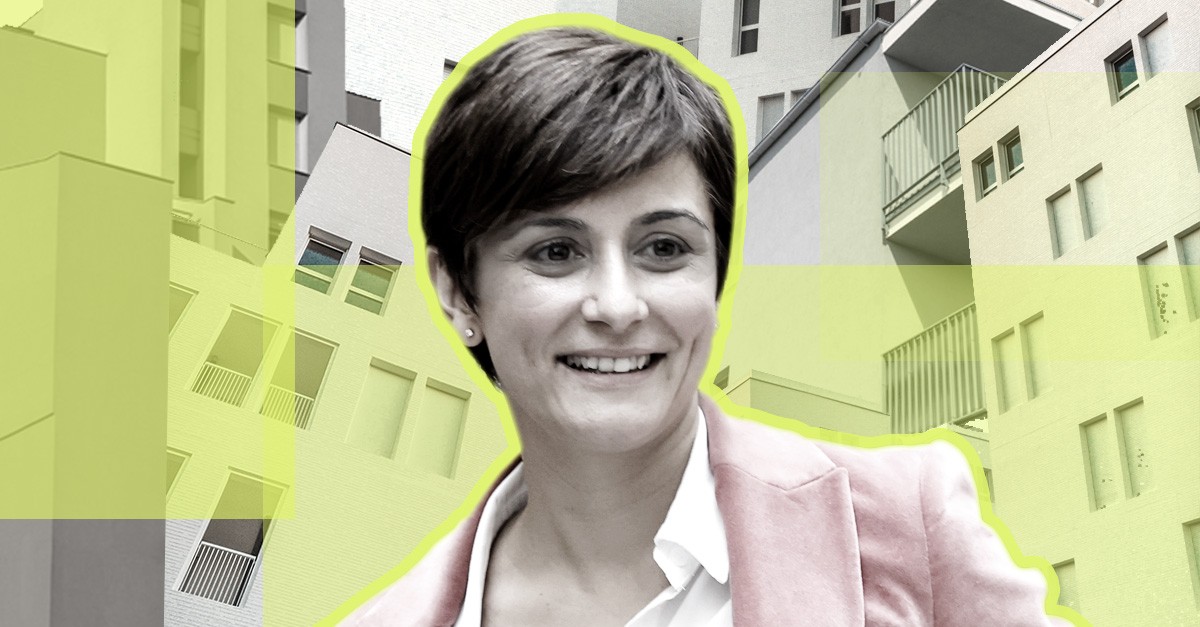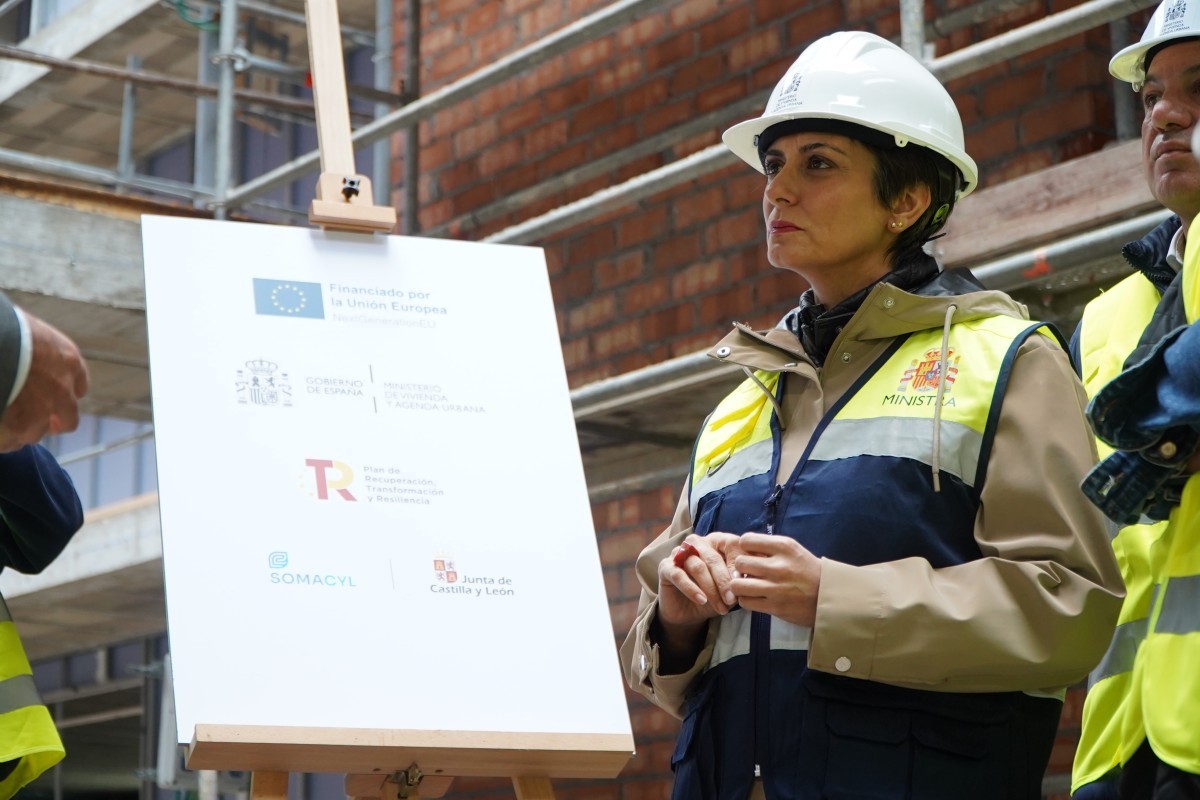
On 21 November, Isabel Rodríguez (Abenójar, Ciudad Real, 44) marks two years at the helm of the Ministry of Housing and Urban Agenda. Following the 2023 elections, Pedro Sánchez elevated housing policy to ministerial level, reviving a portfolio previously overseen by ministers such as Carme Chacón, Beatriz Corredor, and María Antonia Trujillo.
Sánchez tasked Rodríguez, then Government spokesperson and Minister of Territorial Policy, with implementing the newly introduced Housing Rights Act, delivering the 180,000 homes promised during the campaign, advancing the Land Act, and coordinating with the autonomous communities. Rodríguez had been one of Sánchez’s earliest supporters during the primaries.
Over the past two years, housing has become the Spaniards’ primary concern, particularly over the past year, according to the Barometer of the Centre for Sociological Research (CIS). Accessing home ownership has become increasingly difficult, especially for young people, while the rental market has all but disappeared, with supply sharply reduced and prices continuing to soar—even in officially designated high-pressure areas.
Those under 35 have been the hardest hit. In fact, the youth emancipation rate fell to 15.2% in the second half of 2024—the lowest for that period since the Spanish Youth Council (CJE) began collecting data in 2006.
Falling supply, rising demand, and record prices
House prices in Spain continue to climb. Between November 2023 and October 2025, the average price of second-hand homes listed on idealista increased by 26% since Rodríguez took office, reaching record levels of €2,555/m². Madrid experienced the steepest rise (40.3%), followed by Barcelona (21.6%), with average prices exceeding €5,000/m² in both cities.
Meanwhile, housing stock on the sales market continues to shrink. Compared with the third quarter of 2023, homes for sale on idealista have dropped by 22.6% nationwide, with the largest declines in Madrid (-31.1%) and Barcelona (-28.5%).
The combination of high prices and low supply has made homeownership almost unattainable for millions of Spaniards. According to idealista data for Q3 2025, the share of household income required to pay a mortgage averaged 25%, but exceeded the recommended maximum of 30% in Palma (45%), Málaga (38%), San Sebastián (38%), Madrid (33%), and Barcelona (31%). In Q3 2023, the figure stood at 21.4%.
Despite these prices, Madrid continues to face the greatest demand pressure from buyers, with provincial capitals outperforming surrounding suburban areas.
Renting has also become increasingly unaffordable, with families spending on average 36% of their net income on a typical two-bedroom apartment. Palma (46%), Barcelona (45%), Málaga (41%), Valencia (40%), Alicante (39%) and Madrid (39%) are the most affected. Two years ago, rental effort already exceeded the recommended 30%, at 31.1%.
Rents have continued to rise under Rodríguez, averaging €14.50/m² per month—a 21.8% increase in nearly two years. Madrid saw the largest increase (30%), compared with Barcelona (19.7%).
Since the introduction of the Housing Act, which Rodríguez has passionately defended, most of the predicted effects have occurred: supply has collapsed, few long-term rental properties remain, prices continue to rise in double-digit annual growth, and thousands of people struggle to find accommodation. The situation is particularly acute for young people, those over 65, and families with children, all groups effectively pushed out of the market.
Demand continues to grow. In Q3 2025, rental listings on Idealista received an average of 35 enquiries before being removed—a 13% increase on Q3 2024, when the figure was 31.
Barcelona is the only major market to see a slight reduction in competition (-3%), yet 58 people still enquire per listing, while in Madrid the number has risen to 46, up 4% year-on-year.
This scarcity has driven many towards renting rooms, which have also increased in price. Shared-room supply grew 20% year-on-year in Q3 2025, with the average monthly rent rising slightly to €405. Interest in these rentals also increased 2% over the past year. Before Rodríguez’s tenure, in Q3 2023, the average room rent was €380—a 6.6% rise over two years.
Barcelona continues to have the highest room rents (€600/month), followed by Madrid (€550) and Palma (€510). Average interest per listing is 22 people, lower than for full apartments. Madrid (23%) and Barcelona (12%) account for more than a third of all shared rental listings.
Unlike property sales, the most sought-after rentals are located around major urban centres. Thirteen municipalities in Madrid and Catalonia occupy the top 25 demand spots, alongside two in Valencia, two in the Canary Islands, and eight provincial capitals, including Barcelona, but not Madrid.
Market controls fail to solve the housing crisis
Spain’s housing crisis—characterised by minimal supply and high demand—has been worsened by Sánchez’s policies since 2018, particularly in the rental sector. Systematic attacks on landlords, especially small-scale owners who sustain the rental market, have created significant legal uncertainty. The Government coalition partner has labelled them “rentiers” and “parasites,” a strategy that has failed to retain landlords.
Small landlords have seen evictions for unpaid rent halted, illegal occupation rise, annual rent updates capped, and tax deductions on habitual rental income reduced.
The Housing Act, in force since May 2023 under Raquel Sánchez, was one of the last laws passed by the previous PSOE-Podemos coalition. Under Rodríguez, municipalities officially designated as high-pressure markets—where rent increases are capped—have been implemented, covering over 300 municipalities in Catalonia, Navarra, and the Basque Country, including all provincial capitals and A Coruña.
Opposition parties have criticised the Act for being interventionist and increasing legal uncertainty, driving up prices. PP-led autonomous communities have refused to implement high-pressure zones, citing overreach.

The Act has not solved the shortage of affordable housing, particularly in large cities. The Government continues to intervene via the Single Tourist and Seasonal Rental Register, requiring registration of all tourist and short-term rentals listed on platforms allowing remote contracting.
The Government blames tourist and seasonal rentals for the shrinking long-term supply, though these account for less than half of the housing stock lost since 2020. According to idealista, seasonal rentals now represent 15% of all listed properties and continue to grow since the pandemic.
The junior coalition partner, Sumar, has also pushed to regulate seasonal rentals and rooms, aligning them with long-term rental rules under the Urban Lease Act (LAU). PSOE and Sumar agreed on amendments to prevent tenants from being charged taxes such as IBI and to cap seasonal and room rents.
Regarding property sales, Rodríguez has blamed foreign buyers. The “golden visa” programme for non-EU investors (€500,000 minimum investment) ended in April. However, over 12 years, only 16,000 visas were issued—0.3% of homes transacted during that period.
Where are the 180,000 promised homes?
The Housing Act has allowed the Government to develop public housing, which still represents just 2% of Spain’s 26 million homes. Sánchez promised 180,000 homes in this legislature; Rodríguez claims over 100,000 units have been delivered using Next Generation EU funds. The new 2026-2030 State Housing Plan aims to invest €7bn, 60% from the State and 40% from the autonomous communities, though regional consensus remains elusive.
During the 2023 campaign, Pedro Sánchez promised to deliver 180,000 homes during this legislature. The Housing Minister has stated in several interviews that over 100,000 units have already been completed. These public homes have been funded through Next Generation EU resources, and under the new 2026–2030 State Housing Plan, €7 billion is earmarked for housing construction over the next five years, with 60% funded by the State and the remaining 40% by the autonomous communities. Despite this, the Minister has struggled to secure consensus among the regions to ensure the plan meets its targets.

In the drive to increase public housing, the Ministry has transformed the State Land Company (Sepes) into the future Public Housing Company, which will manage and promote the national public housing stock. It has effectively absorbed almost all of Sareb’s available properties for social rent and is acquiring land from other Ministries, such as Defence and the Interior, to begin new housing projects.
What has not yet been disclosed is the cost to taxpayers of transferring hundreds of thousands of Sareb assets to Sepes, as the transfer will not be free and is expected to incur millions of euros in notary and registration fees.
The flagship project of this administration is the Operación Campamento in Madrid, which will deliver 10,700 homes in the capital, most with some degree of public protection. However, construction of the first units is not expected to begin before 2027, similar to other projects in Valencia, Seville, Palma, and more recently on Justice Ministry land.
Pending Land Act Reform
Rodríguez still has the Land Act reform pending. In May 2024, the Government withdrew the draft due to lack of consensus and opposition from PP, Vox, ERC, Podemos, and Junts. PP presented its own reform, but negotiations with PSOE and PNV stalled similarly. Legal uncertainty over urban planning continues, hampering new housing development.
Recent CIS surveys show Rodríguez scores 4.42/10, with only three in ten citizens aware of her role.
A “horrible month” for Rodríguez: €660,000 ad flop and a failed hotline
Isabel Rodríguez has faced two high-profile missteps in recent weeks. A €660,000 advertising campaign meant to shape the housing narrative was abruptly pulled amid widespread criticism, while a new free hotline (047) to provide citizens with housing advice failed to work.
In her defence, Rodríguez had only requested the number from the Ministry of Digital Transition—she never claimed the service was live. Still, the mistakes have sparked one of her worst reputational crises, placing both the hotline and the ad campaign alongside some of Spain’s most infamous government misfires, such as María Antonia Trujillo’s ‘Keli Finder’. Criticism was so sharp that even Sumar, Sánchez’s coalition partner, demanded her resignation unless she delivered more serious housing measures.
Few protected homes, with Madrid in the lead
In the field of protected (subsidised) housing, official data show two very clear conclusions since Isabel Rodríguez became Housing Minister: protected homes (VPO) account for less than 14% of all new construction, and their prices are at historic highs. Very few are being built, and they are increasingly expensive.
From November 2023 to June this year—the latest monthly data available from MIVAU—a total of 162,181 homes were completed in Spain. The vast majority (139,886 units) were on the open market, while only 22,295 were protected homes (13.7%).
These figures include VPOs from state and regional plans, across all tenure types (sale, rent, rent-to-buy, and others), and from both public and private developers. The data leave Madrid and the private sector as the main protagonists.
Looking at the data by autonomous community, Madrid—the region most resistant to the central government’s housing policies—is driving the national market. Since Rodríguez took charge of the Housing Ministry, Madrid has 9,225 protected homes with final approval, representing 41.3% of the national total—more than the combined total of the next three regions: Catalonia (3,570 units, 16%), Basque Country (2,843 units, 12.7%), and Andalusia (2,759 units, 12.3%).
In the other autonomous communities, fewer than 1,000 protected homes have received final approval, while the Canary Islands, Cantabria, Murcia, La Rioja, and the autonomous cities of Ceuta and Melilla have none.
By type of developer, the data also do not position the Administration as the leader. Of the 22,295 approved protected homes, the vast majority were developed by the private sector (16,504 units, 74%) versus 5,791 by public developers.
Regarding protected homes under construction, MIVAU data show that 35,177 units have begun construction since November 2023 across Spain, with a clear upward trend compared to previous years.
The most striking figure during Rodríguez’s two-year tenure came in October 2024, when over 4,900 provisional VPO approvals were recorded—the highest level in more than a decade (since June 2011). Madrid was a major contributor, accounting for 4,312 approvals that month.
The PP-governed region under Isabel Díaz Ayuso also tops the national ranking of VPOs started, with over 14,800 units in the analysed period, representing 42.1% of the national total.
Beyond homes started or completed, protected housing prices have reached record highs under Rodríguez. According to MIVAU data, the average assessed value of VPOs in Q3 2025 was €1,195.70/m², the highest in the series dating back to 2005, up 2.4% year-on-year.
With all this, the housing problem continues to grow, and the Government is expanding its measures. The latest proposals from Pedro Sánchez and Isabel Rodríguez include promoting more homes, increasing regulation of REITs (socimis), tourist flats, and property purchases by non-EU foreign residents in Spain.
One of the most notable measures is a 100% income tax exemption for homeowners who set rents according to the state reference index, as well as the creation of a public guarantee system to ensure landlords receive rental payments.
Rodríguez has little reason to celebrate her two years at the helm of the Government’s most controversial ministry, at a time when housing has become the most pressing problem for millions of Spaniards, who watch in horror as there is no solution in sight, supply remains scarce, and prices continue to soar.
For the remainder of the legislature, there is little indication that the situation will improve, according to real estate consensus forecasts, and the tendency to follow the path first set by Podemos and later by Sumar against landlords does not bode well. The sector insists that Rodríguez should perhaps listen more to the experts who have visited her office and less to the political strategists she hired after dismissing the technicians. In the housing crisis, it is no longer about building narratives, but building homes. Spaniards deserve fewer stories and more solutions.

